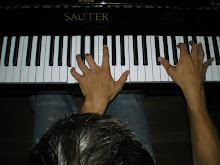I have, in part, unleashed a minor firestorm of political debate on the
Fredosphere (contradiction in terms? hardly). I left some rather angry comments after reading a painfully misguided essay by a mr. Mark Steyn which can be read
HERE.This essay is subtitled "
The real reason the West is in danger of extinction. ", if that alone does not give you the tip that this is going to be a flurry of stupidity, i dont know what to say. Mr. Steyn's histrionics and bombast does nothing but inflame my hostility. here i will post my angry comments for reference:
Im not afraid to say it- that was a terrible essay. His entire construction relies on so many stupid assumptions- assumptions which are baseless and, at best, insulting. excuse me, Mr. Steyn, Islam is not the enemy, secularism is not the enemy. He can continue his xenophobia all he wants, he can intellectualize it and water it down by expressing it in beautiful language, but at its core its still the same bullshit... "Western civilization"? please. This is the same type of chicken-little rhetoric/shit that nazis and arian-race f---ers talk about (no, seriously, it is). He should take a lesson from that fact, come to terms with his insane assumptions and shut the hell up. Provocative, yes, moronic? certainly.
Then i post again, to further express myself:
oh, and the question he pushes "the extinction of western civilization" is, like he rest of his essay, bullshit. What is western civilization, i ask you (or Steyn, really)? Is it the institutions and governments we have today? because if it is, then certainly it wasn’t western civilization 200 years ago, or even 100 years ago in europe or America. So what is it? If we say western civilization is ideas- concepts about life - then i fail to see how that will die out. There is no solidity in "western civilization" its not defined as a thing or one trait, and there never was. In reality, we exist in an entirely different culture than 100 years ago, and i think its safe for steyn to assume culture will again be different in 100 years, but its moronic to assume that somehow represents the "death" of western civilization. As far as im concerned the greatest threat "western civilization" was the book burning and zealous anti-humanism and anti-rationalism of the nazi period. Then it is ironic and somewhat terrifying that he uses similar rhetoric.
Others posted legitimate comments - more moderate than my own.
Tangaleo Lentil Smith responded...
To m. keiser: 1. What are Steyn's stupid assumptions? Please list them.2. Agree with you on Western Civ. Not sure what the definition of that is supposed to be.3. I wonder what bin ladens definition of Western Civ. is. Just curious.
Steyns stupid assumptions are numerous and disguised. I am forcing myself to write this post. Subjecting myself to moronic essays of the right-wing is not my cup of tea, im not a mental masochist. Its wonderful to know that there are
some people out there who enjoy that sort of thing, so they can refute them intelligently for the rest of us. Nevertheless, i have written this short list of the dangerous assumptions made in (just!) the begining of the essay. I very well may be missing things.
#1)
In the future, most Western European countries will disappear.
This kind of crystal-ball prediction irritates the hell out of me, ooooo... the future! there will be flying cars too and vengeful HAL computers, did he fail to mention that? Also- language is a constant barrier. Worst of all, he treats this hypothetical as a fact.
#2)
We've prioritized the secondary impulse over the primary ones.
Steyn makes an arbitrary, ideologically-infused distinction between "primary" and "secondary" governmental functions (basically conservative vs. liberal, but disguised as "primary and "secondary"). Thats not the purpose of this essay, and its moronic in the first place to try and make this dichotomy.
#3)
the secular social-democratic state wont be able to sustain itself: Steyn makes the assumption that secular social-democratic states requires a continually increasing population in order to sustain themselves and that a secular society simply wont produce enough babies. Do we know this to be true? cite an example of a secular social-government that collapsed because of a lack of babies. Dont have one? thats a shame... because we dont know of it ever happening. Its a moronic assumption.
#4)
Religion is required for population increase- because only religious people produce enough babies. I think this pretty much speaks for itself. Yes, some religions encourage babies (Mormons, ( Catholics?)) but that is still a moronic assumption.
#5)"
Islamism is the enemy" - He says Islam is a problem for cultures all over the world. I was so baffled by this quote that i was pretty much unable to give a coherent response. If you believe this assumption, you're already very, very lost. Radical Islam is a problem, yes, but do you really believe that most Muslims are fundamentalist wack-jobs? Just a tangent- from personal experience, the Muslims i know (*many) preach about love and would want nothing more than to get rid of those Islamic extremists who give their religion the horrible name.
#6)
"western civilization" is more than just a really abstract phrase, but a very real tangible thing: its as if he believes “western civilization” is some coherent thing tied to governments and religions and society, which is simply logically flawed if he considers anything before WWI western civilization. If he believes governments/society/religion is what defines "western civilization", like i said earlier, then Rome was not part of western civilization (different society structure and behavior, different language, different religion, different government) neither was Greece, or the Middle ages, or the Enlightenment period or even the 19th century. They all had radically different societies. The fact is, "western civilization" is a empty phrase, devoid of much meaning at all.
#7)
The progressive agenda--lavish social welfare, abortion, secularism, multiculturalism will cause the collapse of western civilization: Multiculturalism and secularism will cause the collapse of "western civilization"?! now are we starting to sound like nazi/neo-nazi propaganda? It has that ring to it, doesnt it? This is so absurd that i cant really express myself. Im stifled by the sheer stupidity of this assumption and shocked by its unabashed xenophobia. This assumption is founded on an all-pervasive conservative-ideology/dogma which is itself a construction of unexplainable assumptions.
Oh, im fuming. I cant continue this right now. I honestly haven’t read the entire essay, i admit it, i just couldn’t continue to read this stuff, it was too painful to finish. I got over half way there and then i skimmed the rest. No nice language can cover up the true meaning here. The wall street journal should be ashamed of themselves. This is disgusting.



